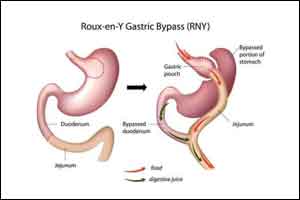- Home
- Editorial
- News
- Practice Guidelines
- Anesthesiology Guidelines
- Cancer Guidelines
- Cardiac Sciences Guidelines
- Critical Care Guidelines
- Dentistry Guidelines
- Dermatology Guidelines
- Diabetes and Endo Guidelines
- Diagnostics Guidelines
- ENT Guidelines
- Featured Practice Guidelines
- Gastroenterology Guidelines
- Geriatrics Guidelines
- Medicine Guidelines
- Nephrology Guidelines
- Neurosciences Guidelines
- Obs and Gynae Guidelines
- Ophthalmology Guidelines
- Orthopaedics Guidelines
- Paediatrics Guidelines
- Psychiatry Guidelines
- Pulmonology Guidelines
- Radiology Guidelines
- Surgery Guidelines
- Urology Guidelines
Weight loss surgery associated with increased risk of IBD

Dr. Jean-Frederic Colombel, of the Icahn School of Medicine at Mount Sinai, in New York and associates, conducted a multi-institutional case series of patients with a history of IBD and weight loss surgery.The researchers found a link between the development of inflammatory bowel disease (IBD) and a past history of weight loss surgery.The new analysis revealed that a past history of weight loss surgery was associated with a nearly 2-times increased likelihood of developing IBD.The study has been reported in Alimentary Pharmacology & Therapeutics.
For the analysis, investigators first conducted a multi-institutional case series of patients with a history of IBD and weight loss surgery. A total of 15 cases of IBD with a prior history of bariatric surgery were identified and reviewed. They next conducted a matched case-control study using medical and pharmacy claims database from 2008 to 2012. A total of 8980 cases and 43,059 controls were included in the database analysis.
A past history of weight loss surgery was associated with a nearly 2-times increased likelihood of developing IBD. The mechanism by which weight loss surgery may increase the risk of IBD is unclear. Alterations in gut microbes following the surgery may play a role. In addition, weight loss surgery patients have elevated rates of vitamin D and bile salt deficiencies.
Prospective studies are needed to confirm the association found in this analysis and delineate if certain types of weight loss surgeries have differential effects on risk of IBD. "While we do not think our findings should at all discourage or take away from the health benefits of bariatric surgery, since the absolute risk of developing IBD following bariatric surgery remains extremely small, we think this association highlights potential disease mechanisms and the need to carefully evaluate new gastrointestinal symptoms in patients with prior weight loss surgery," said senior author Dr. Jean-Frederic Colombel, of the Icahn School of Medicine at Mount Sinai, in New York. "Of note, another recent study from the Mayo Clinic had similar findings calling for the need for further prospective studies on this topic."
For more details click on the link: http://dx.doi.org/10.1111/apt.14569

Disclaimer: This site is primarily intended for healthcare professionals. Any content/information on this website does not replace the advice of medical and/or health professionals and should not be construed as medical/diagnostic advice/endorsement or prescription. Use of this site is subject to our terms of use, privacy policy, advertisement policy. © 2020 Minerva Medical Treatment Pvt Ltd